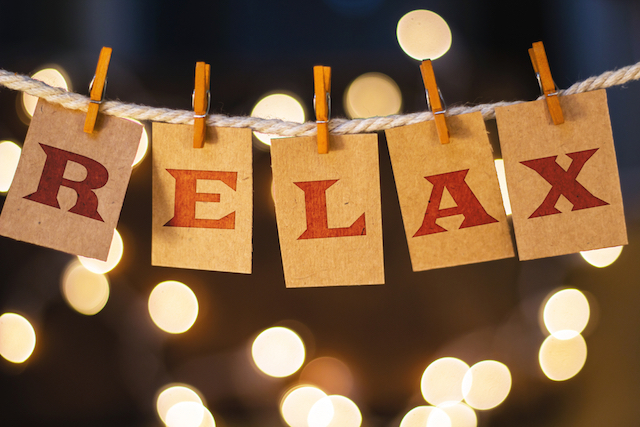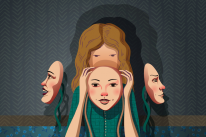
“To heal a wound, you need to stop touching it.” ~Unknown
I’ve always been an overachiever. In sixth grade, I spent weeks memorizing over five pages of the poem “Horatius at the Bridge” for extra credit, even though I already had an A in the class.
When I started therapy in my mid-twenties to deal with depression and panic attacks, I turned my overachieving tactics to self-improvement. I spent hours journaling, going to meetings, talking to mentors, reading books, and beating myself up when I fell into old habits.
I always worried: Was I doing it right? Was I making enough progress? Would I feel better, find enlightenment, or be a better person in the end?
That’s when I began to notice a pattern that surprised me.
I found that when I first had an insight, discovered a tool, or began a new practice, I got very excited. It worked wonders for me and I could feel a sense of growth and expansion.
I’d begin to try harder to generate more insights and discover more tools. But as I redoubled my efforts and worked harder at healing, I’d begin to feel anxious, self-critical, and depleted. The harder I tried, the less enlightened I felt.
At some point I’d give up. I’d let go of trying to become the next Buddha and accept the fact that I was just going to be neurotic and flawed the rest of my life.
And that’s when the insights and growth would start again. That’s when I would suddenly experience the most healing and notice the biggest changes in my life.
Why was this? I wondered.
And then one day it hit me: When we get injured, our body knows what to do and mends itself automatically—we don’t have to try. We’re designed to self-heal physiologically. It occurred to me then that perhaps we’re designed to self-heal mentally, emotionally, and spiritually as well.
Why We Don’t Need to Try So Hard
Once I recognized our capacity to self-heal, I began to see evidence of it everywhere. Here are three common ways I’ve seen it work:
1. The insight, answers, and wisdom we need are always within us and emerge in their own time.
One of the things I’ve learned through years of struggling with depression is that no matter how miserable, confused, and hopeless I feel, clarity always returns at some point and I know exactly what to do.
For instance, a few months ago I was feeling depressed for a few days and couldn’t for the life of me figure out why.
Then suddenly one night I woke up and it was clear: I was trying to do too much. I was overcommitted. I was doing too much to please other people.
What I really needed was space for rest and relaxation. I cut back on a couple of commitments and took some time to rejuvenate. The depression lifted and things started to go a lot better for me.
I get off-track a lot, but the wisdom is in there, and it always comes out when I allow space for it to emerge.
2. When we miss a lesson, we’ll get new opportunities to learn it until we get it.
Growing up, I struggled with my sister because when we fought, she would judge or blame me. I didn’t know how not to internalize that criticism and feel unworthy because of it.
Then, years later, I fell in love with a man who did the same thing. He helped me realize that when he got angry and blamed me, he was actually feeling vulnerable or hurt himself. I learned how to use his judgment to help me connect to compassion and love—for him and myself—rather than guilt and shame.
I didn’t consciously seek someone out who reminded me of my sister, but something within me drew me toward him, allowing me to work out a new way of dealing with blame.
3. Our pain won’t let us stay off course for long.
I was shocked when I learned that a runny nose and fever are more than mere byproducts of having a cold; they’re actually the body’s way of healing itself by flushing or burning out those mischievous germs.
Similarly, our pain and neuroses are often our spirit’s way of getting our attention and guiding us so we can heal.
Case in point: several years ago I began to have trouble sleeping. Falling asleep became more difficult and before long I was sleeping only three to six hours a night, if at all. I was exhausted, cranky, and miserable much of the time.
It took a long time, but eventually I noticed patterns in what kept me from sleeping. Some nights I would lie in bed wide awake until I finally allowed myself to feel an emotional response (i.e.: fear, anger, disappointment, etc.) that I was pushing away or avoiding. Once I felt the feeling, sleep came quite easily.
Other times I couldn’t sleep because I was being particularly hard on myself that day. I struggle with a very active inner critic and high expectations for myself, and on these nights sleep wouldn’t come until I dropped my critic’s attack and directed some compassion and love towards myself.
I had tried ignoring the problem, powering through, or finding quick fixes, but they didn’t work. The insomnia forced me to address what was at the heart of the issue. Far from being an unlucky curse, the pain of not sleeping actually helped me to take the next step on my path to healing and wholeness.
The Key to Allowing Self-Healing to Happen
The reason so many of us spend so much time in pain and misery (myself included) lies in the difference between our egos and our true selves.
Our true selves—who we are beneath the fears, the defense mechanisms, and the limiting beliefs—are wise, whole, and deeply connected to the larger world.
Our egos, on the other hand, feel separate and alone and rigidly hold onto a particular set of habits and identities in an effort to feel okay in the world. We all have access to both.
When I’m trying to grow and develop, I’m often caught in ego. I want something—peace, enlightenment, the respect of my peers, or an image of myself as an evolved person. I feel like I need to change something about myself in order to be worthy or good enough.
When I’m coming from ego, I obsess. I strive. I effort. I compare myself to others and become convinced that I’m the least enlightened creature on the planet.
All this striving and comparing is the mud that gums up the works of my self-healing process. That’s why it sometimes takes so long to work: I get in the way.
To allow my self-healing process to unfold with its full power, all I need to do is relax.
When I stop trying so hard, I reconnect with my true self. I have access to the fundamental wisdom and strength we all share. When I trust my inner workings to do their thing and simply observe what’s happening without trying to change it, my ego relaxes and healing happens naturally.
To that end, I’ve found a few questions that help me heal and grow with less interference:
Where am I striving with the intention of fixing myself or becoming more perfect? What would I do if I were to fully accept that I’m good enough as I am and that I’m exactly where I should be?
What would nourish and nurture me right now? What would help me relax and feel safe enough to let go of old patterns?
What is my inner wisdom trying to tell me right now? And if I’m not sure, how could I create enough space in my head and my life to hear what it has to say?
We don’t always receive satisfying answers right away. That’s okay—in my experience, if we keep asking the question long enough, eventually we’ll get more clarity. It just may take a little longer than we expected.
The process of relaxing into the process of change isn’t an easy one; knowing that I’m self-healing doesn’t mean my ego never gets stirred up or I don’t fall back into striving and obsessing. In fact, I believe that getting in our own way is an inevitable and enlightening part of the process, and I like to think that my inner wisdom is strong enough that it can handle whatever my inner foolishness throws at it.
At some point I always become aware that I’m efforting again, and that’s when I can chuckle, pat my ego on the head, and remind it that it doesn’t need to try so hard. I can return to the questions, listen for answers, and then pray for the willingness to let go once again.
Relax image via Shutterstock
About Meredith Walters
Meredith Walters is a coach and author who loves to help people who are still unsure what they’re meant to do in the world find their calling, forge their own path, and discover the hero within. Click here to get a free guide with 50 practical ideas, resources, and exercises to help you find your calling without losing your mind (or your shirt).













 Though I run this site, it is not mine. It's ours. It's not about me. It's about us. Your stories and your wisdom are just as meaningful as mine.
Though I run this site, it is not mine. It's ours. It's not about me. It's about us. Your stories and your wisdom are just as meaningful as mine.